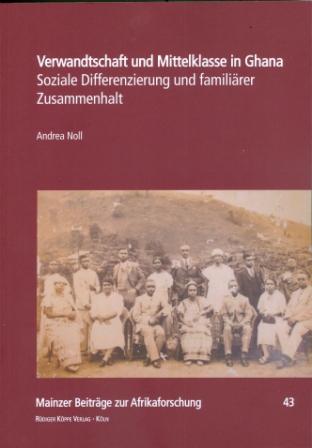
Verwandtschaft und Mittelklasse in Ghana
Soziale Differenzierung und familiärer Zusammenhalt
Author: Andrea Noll. Series edited by: Heike Drotbohm, Matthias Krings, Nico Nassenstein, Anja Oed, Markus Verne.
Series: MBA Mainzer Beiträge zur Afrikaforschung Volume 43
2019279 pp.
1 colour map, 5 colour genealogies, 2 b/w genealogies, 4 colour photographs, 2 b/w photographs
Text language(s): German
Format: 170 x 240 mm
620 g
Paperback
€ 49.80
Buy 'Verwandtschaft und Mittelklasse in Ghana' as a downloadable PDF document directly from our online shop »
Order 'Verwandtschaft und Mittelklasse in Ghana' as print edition »
Social classes are usually considered entities that comprise entire families consisting of several generations. In African countries, most families are multi-class families. Based on ethnographic fieldwork in Ghana, Liberia and New York, this study examines the diverse strategies and practices employed by members of three extended families from Ghana to encounter social inequality and class differences within their families. The local actors understand families as larger, flexible kinship networks that comprise several generations, numerous members and different lifestyles.
What does it mean for the kinship group when a small number of family members achieve upward social mobility through formal education and corresponding occupations? How is family redefined and how is support beyond one’s nuclear family negotiated? What factors facilitate or hinder a transgenerational transmission of the new middle-class status? To answer these central questions, the author analyses how the family members themselves remember their family history and thereby (re)construct family ties. It is a central concern of this book to show how social history and family history intertwine and how specific historic trends offer opportunities for upward social mobility or bring about social decline.
About the author:
Andrea Noll works as researcher in the Institute of Social Anthropology and African Studies at the Johannes Gutenberg University in Mainz/Germany. Her academic studies included social anthropology, cultural anthropology and Romance philology.
Following the links below you will find further publications on Ghanaian cultures:
Accompanying material:
- Die Konstruktion von Ethnizität
(ISBN 978-3-89645-207-8 ) - Hexenjagd und Aufklärung in Ghana
(ISBN 978-3-89645-909-1 ) - Voices of Affliction
(ISBN 978-3-89645-245-0 )
Cross-reference:
- A Linguistic Study of Ewe Animal Names among the Ewe of Ghana
(ISBN 978-3-89645-474-4 ) - Basic Ewe for Foreign Students
(ISBN 978-3-89645-584-0 ) - Kurzgrammatik des Ewe
(ISBN 978-3-927620-19-3 )
Reviews
Die Arbeit liefert eine Fülle an ethnographisch sehr gut belegten Ergebnissen. Die Dichte der ethnographischen Beschreibung ist vorbildlich und regt weitere Fragen an. In der neueren Literatur zu afrikanischen Mittelklassen spielt etwa die Untersuchung des Hausbaus als ein Identitäts- und Statusprojekt eine wichtige Rolle. Dieses Thema wird von Andrea Noll nur am Rande erwähnt. Gleiches gilt für die Darstellung und Analyse familiärer Konflikte. Mit Ausnahme eines auf Seite 195 geschilderten Konfliktes findet sich kaum etwas zu Familienstreitereien. Da alle drei Familien relativ wohlhabend sind, ist allerdings zu vermuten, dass etwa auch Erbkonflikte die Familien prägen und geprägt haben. Die Arbeit bringt nicht nur die Erforschung afrikanischer Mittelklassen entscheidend voran. Aufgrund ihres originellen Ansatzes und ihrer fundierten historischen und ethnographischen Beschreibungen verwandtschaftsbasierter Klassenbildung liefert sie auch für die Verwandtschafts- und Wirtschaftsethnologie eine Vielzahl an innovativen Erkenntnissen und Anregungen.
Julia Pauli in Sociologus, 71/2021, 95-97
| « back | Print version | [top] |
 Books
Books Audio
Audio Biographies
Biographies Series
Series Festschrifts
Festschrifts Journals
Journals